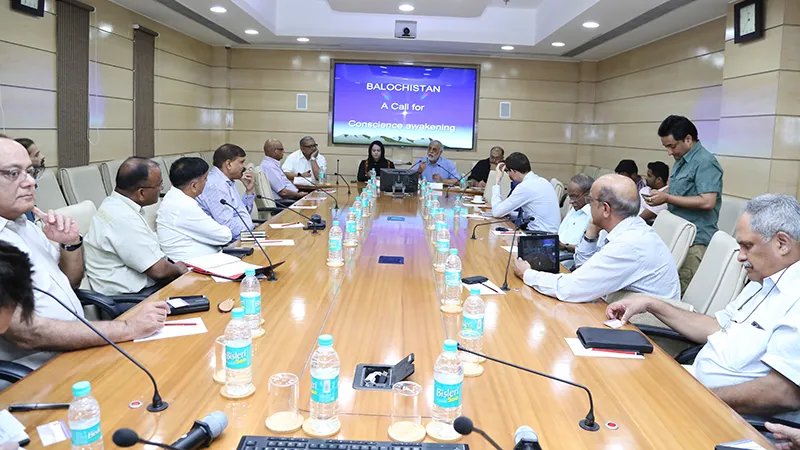Balochistan, whose people for long have been leading a struggle for independence from the clutches of Pakistan, has now come under a joint Pakistan–China occupation, said Professor Naela Quadri Baloch, the president of the World Baloch Women’s Forum.
Delivering a talk on ‘Balochistan at Crossroads: The World Needs a Conscience’ at Observer Research Foundation, Delhi on April 8, 2016, Prof. Quadri said now the Baloch people’s struggle has become much harder following the agreement between Pakistan and China to create the China–Pakistan Economic Corridor (CPEC) agreement.
She pointed out that with the China–Pakistan Economic Corridor occupying the Baloch coastline from Karachi to Kashgar, the Balochis now would have to fight the joint occupation.
Prof. Quadri said the Gwadar port, being developed with the support of China, will be utilised as a Chinese naval base and shall connect to Kashgar through Karachi. She pointed out that China and Pakistan share common interests, particularly rivalry against India on issues such as land disputes related to Tibet, Kashmir, Indian Ocean etc. Both the countries also have common interests on nuclear proliferation, gold mining/gold snatching, demand for energy.
Pakistan and China are also engaged in carrying out nuclear tests on Balochistan soil, the first one being done on May 28, 1998. Apart from this, they are involved in exploiting the resources such as the gold mines in Saindak and Rekodek, she said.
Accusing Pakistan of carrying out genocidal activities to suppress the freedom movement within Balochistan, Prof. Quadri felt that “an independent Balochistan is the only antidote for China–Pakistan anti–India coalition”. She sought Indian support towards the liberation of her people.
Prof. Quadri reminded the audience that Balochistan was under the British colonial rule and it was annexed by Islamabad on August 27, 1948 through a military raid. Since then, the political demand for freedom was answered by military operations from Pakistan, she said.
Highlighting the atrocities committed by Pakistan, she pointed out that from the year 2000 to March 2016, approximately 200,000 Balochis have been killed by the Pakistan army and over 25,000 enforced disappearances of both men and women. At present, there is a war–like situation in Balochistan, including bombings through jets provided by the United States and China.
According to Prof. Quadri, Pakistan’s assets comprise of the army and the radical religious extremist terrorists. She voiced her concerns on how both United States and China are providing Pakistan with necessary weapons and funds that are being utilized against the Baloch people. According to her, US dollars are giving oxygen to Pakistan, without which it will be hard for them to survive.
India and Balochistan
According to Prof. Quadri, it would be in the larger strategic interest of India to support the liberation movement in Balochistan and the Indian leadership should draw from the example of Mrs. Indira Gandhi who actively supported the liberation movement in Bangladesh and played a great role in 1971. Prof. Quadri appealed to the Indian leadership to stand up against the human rights violations occurring in the region. She highlighted how Pakistan has been violating all eight UN indicators of Genocide such as dehumanisation, polarisation, extermination, denial, etc.
Prof. Quadri made a strong case for an independent Balochistan that can be of great advantage and assistance to India. She said India and Balochistan are natural allies, with strong historical, civilisational roots as well as people to people relationship. She said for India, security has become extremely important, due to the presence and obvious challenges of border issues, nuclear security etc. from China and Pakistan. Balochistan can also fulfill the demand for India’s energy as it is rich in natural oil and gas. Also, an independent Balochistan can provide India a convenient market access towards Central Asia, she said. She also opined that the TAPI (Turkmenistan–Afghanistan–Pakistan–India) gas pipeline project should have Balochistan instead of Pakistan as a member.
Prof. Quadri said that the Indian Government should lobby on grounds of the UN Declaration against Genocide in 2012 that led to the creation of Kosovo. India should strongly support the restoration of Balochistan, as Mrs. Indira Gandhi strongly lobbied for Bangladesh against genocide and resulted in a free and independent Bangladesh. She emphasised how it is essential that the UN intervenes and puts an end to the genocidal activities.
Providing an Indian perspective, Mr. Sushant Sareen, Senior Fellow at the Vivekananda International Foundation (VIF) said India should extend support to the Balochi people, given the grave atrocities, exploitation of mineral resources, nuclear testing on Baloch soil by Pakistan and China in the region. He agreed that Balochistan has become a protectorate of Chinese and Pakistani interests.
Mr. Kanchan Gupta, journalist, said India’s position on Balochistan has been rather ambivalent. He said it is essential for the nation to give moral and diplomatic support towards a peaceful resolution of the conflict. According to him, one such option for India could be to put the issue of Balochistan openly on their agenda vis–à–vis Pakistan. Mr. Gupta said a successful Balochistan policy can lead to the forging of a successful Pakistan policy.
However, the hard question that remains is whether Prime Minister Narendra Modi can take a stand similar to Mrs. Indira Gandhi in 1971 on the Bangladeshi liberation, he wondered. Therefore, India will have to take a political call on the issue of Balochistan at the same time being mindful of its political consequences, Mr. Gupta said.
This report is prepared by Sabah Ishtiaq, Junior Fellow, Observer Research Foundation, New Delhi.
The views expressed above belong to the author(s). ORF research and analyses now available on Telegram! Click here to access our curated content — blogs, longforms and interviews.




 PREV
PREV

